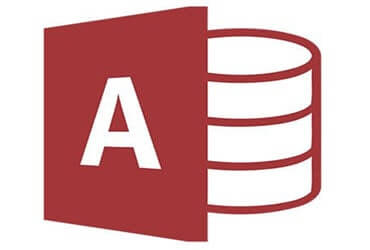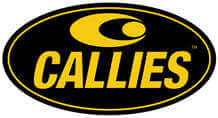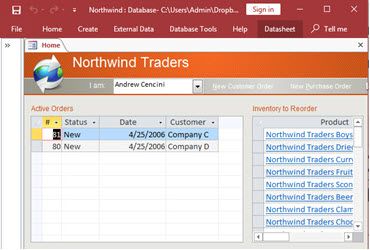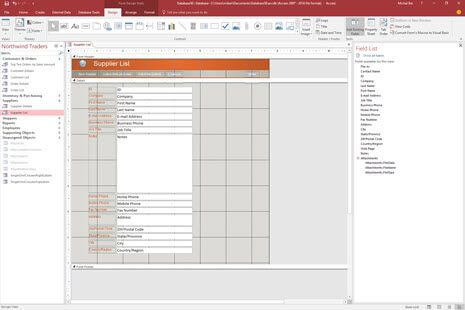
MS Access As A Dev Tool
Access continues to be a highly efficient tool for business database development.
The Best Microsoft Access Database Solutions owner, consultant, and principal programmer is Alison Balter - a recognized expert Microsoft Access consultant. Alison is the author of 15 Microsoft Access training books and videos. She is a frequent guest speaker at MS Access conferences and has developed hundreds of applications for businesses of all types.
We know your business data is important; we listen to your concerns, ask questions, and gather information from all stakeholders. We discuss your needs and requirements for your database. We find out what you want, why you need various features so we can obtain as much information as possible. Once we have the information we need, we work with you to design the proper database architecture, plus the dashboards, the questions (queries), forms, and reports you need for an excellent database system.

We also create websites designed for speed to display your data accurately, using ASP.NET technology. Fast, secure, and robust, our ASP.NET websites and web applications give you true business tool for finding and displaying information dynamically on the web.








Access continues to be a highly efficient tool for business database development.

How to create a Microsoft Access application with some unique tips and tricks.

Your Access developer near me has some great info for you about using Access efficiently.
Call MS Access Solutions at (323) 285-0939 for your FREE consultation.
At MS Access Solutions, we've seen firsthand how Visual Basic for Applications (VBA) transforms ordinary databases into powerful business solutions. While many users interact with Access through its graphical interface, VBA provides the programming muscle that extends functionality beyond what's possible with forms and macros alone. This programming language embedded within Access allows us to create custom solutions tailored to specific business requirements, automating complex processes and enhancing user experiences.
VBA serves as the programming backbone of Microsoft Access, providing developers with complete programmatic control over database objects. When clients come to us with requirements that exceed what's possible through the standard interface, we turn to VBA. This powerful language allows us to manipulate tables, queries, forms, and reports through code, creating dynamic solutions that respond intelligently to user actions and business rules.
The VBA Editor, accessible by pressing Alt+F11 in Access, provides the development environment where we write and test code. This interface includes tools for writing procedures, debugging code, and organizing modules. For new developers, the Object Browser (F2) offers an invaluable reference to the available objects, properties, and methods within the Access object model.
When developing Access applications with VBA, we emphasize proper code organization from the start. We structure code into logical modules: standard modules for general-purpose procedures and form/report modules for event-driven code. This modular approach makes applications easier to maintain and update as business needs evolve.
Consistent naming conventions significantly improve code readability. We prefix variables with their data type (strName for strings, intCount for integers) and use descriptive names that clearly indicate purpose. This practice reduces errors and makes code more accessible to other developers who might maintain the application in the future.
One distinction between amateur and professional Access development lies in comprehensive error handling. We implement structured error handling in every procedure using On Error statements, capturing and managing exceptions before they disrupt user workflow. This approach prevents the dreaded runtime errors that frustrate users and undermine confidence in applications.
A robust error handling strategy includes logging errors to a dedicated table, providing meaningful messages to users, and gracefully recovering from exceptions when possible. This attention to detail creates resilient applications that maintain data integrity even when unexpected conditions arise.
Access VBA applications can deliver impressive performance when properly optimized. We follow several key principles to ensure efficient execution. First, we minimize database calls within loops, gathering necessary data before entering iterative processes. Second, we use With statements to reduce object references and improve code efficiency.
When working with large datasets, we leverage SQL rather than VBA loops for data operations. A single well-crafted SQL statement often outperforms dozens of lines of iterative VBA code. Additionally, we temporarily disable screen updating during intensive processing operations, dramatically improving perceived performance for users.
Modern Access applications rarely exist in isolation. We use VBA to connect Access databases with external systems, from SQL Server backends to cloud services. ActiveX Data Objects (ADO) provide a powerful mechanism for these connections, allowing Access to serve as a flexible front-end f or enterprise data systems.
Recent developments have expanded integration possibilities further. We now use VBA to connect Access with Microsoft 365 services and Power Platform components, creating hybrid solutions that leverage the strengths of multiple technologies. This approach allows organizations to modernize gradually rather than abandoning their Access investment entirely.
Security remains a critical concern in Access development. We implement proper user authentication and authorization through VBA, validating all user inputs before processing. For distributed applications, we use digital signatures to verify code integrity and prevent unauthorized modifications.
We follow two guiding principles in our development approach. First, "Think Excel Before VBA" reminds us to use built-in Access features when a vailable rather than reinventing functionality through code. Second, "Think, But Think Object" encourages leveraging object-oriented approaches for cleaner, more maintainable solutions.
Despite the rise of newer technologies, Access VBA continues to evolve and remain relevant. Microsoft has enhanced memory handling through Large Address Aware support and improved integration with modern platforms. For organizations with existing Access expertise, VBA provides a practical path to modernization without abandoning previous investments.
The combination of a visual interface for rapid development and the programming power of VBA makes Access uniquely positioned as both an entry point for novice developers and a serious platform for professional programmer. By mastering VBA, developers unlock the full potential of Access as a versatile business application platform.
When you need a Microsoft Access programmer for your La Mirada, California business, organization, or agency, call MS Access Solutions at (323) 285-0939. We have over 25 years experience programming Microsoft Access database applications.
At MS Access Solutions, we specialize in creating powerful database applications that solve real business challenges. Our team brings decades of combined experience to every project, ensuring your Access solutions perform optimally while meeting your specific requirements.
We've successfully delivered custom Microsoft Access solutions across numerous industries, including, but not limited to:
We handle the full spectrum of Access database needs, from complex enterprise solutions to smaller targeted projects:
Our approach combines deep technical expertise with practical business understanding. We don't just fix technical issues; we ensure your Access applications function flawlessly while supporting your organization's goals. Every solution we deliver is designed to keep your operations running smoothly while providing the insights you need to make informed decisions.
More information about our programming services is available on the Microsoft Access programmer web page.